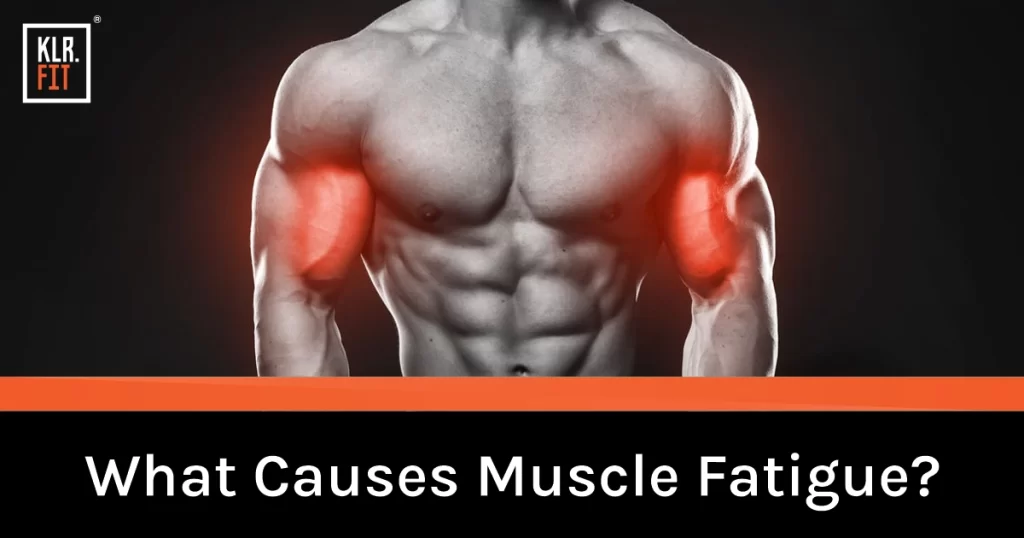What is muscle fatigue?
At the start of exercising or when performing tasks, your muscles feel strong and resilient. However, over time and after repeating movements, your muscles may begin to feel weaker and tired. This can be defined as muscle fatigue.
Muscle fatigue is a symptom that decreases your muscles’ ability to perform over time. It can be associated with a state of exhaustion, often following strenuous activity or exercise. When you experience fatigue, the force behind your muscles’ movements decreases, causing you to feel weaker.
Some of the causes of muscle fatigue are:
- Depletion of phosphocreatine concentration
- Accumulation of hydrogen (H+) and changes in pH values
- Depletion of glycogen in muscle and decreased glucose in the blood
Sleep, recovery, and a proper diet are all critical for reducing muscle fatigue. Sleep deprivation results in reduced protein synthesis, which decreases the body’s ability to restore muscle damage. Without proper recovery, muscle growth will be stunted and exercise-induced stress will remain high. And, of course, without proper nutrition—especially protein intake—energy levels will decline and muscles will begin to waste away.
Acute Fatigue
Acute fatigue generally refers to exercise-induced fatigue. Compared to a consistent drop in energy levels, acute fatigue is often an everyday occurrence. Possible sites of exercise-associated acute fatigue can be:
- Accumulation of lactates
- Inhibition of the Ca2+ release of the sarcoplasmic reticulum
- Glycogen stores decline
- Inhibition on motor neural drive
- Cytokine released during exercise
Overtraining Fatigue
Overtraining fatigue represents a more serious physiological problem. It usually occurs when the balance between training and recovery is disproportionate. The average man loses 1 percent of his muscle mass after age 30. If schedule and training are not adjusted to allow proper recovery for this reduction in capacity, overtraining-induced fatigue may occur.
While long-term decreased training capacity can occur without any evident physiological or psychological signs of overtraining, it could also reflect on mood state, immune system, biochemistry profile, sleep, etc.
Recovery from overtraining could last from 4 weeks to 6 months or even a year. Overtraining can even lead to a reduction in your capacity to produce ATP.
What Is ATP?
Adenosine triphosphate (ATP) is the body’s “molecular currency,” created during the Krebs cycle (also known as the citric acid cycle). Carbohydrates are the predominant fuel source and the reactions that make up the cycle require oxygen, which is why it is also known as “aerobic” metabolism.
Prolonged, low-intensity exercise activities, such as walking and cycling, require a great deal of oxygen to run this cycle and generate the needed energy. In contrast, high-intensity sports that rely on repeated short bursts of energy use anaerobic (no oxygen) metabolism. Weightlifting is classified as anaerobic activity.
Oxygen is not necessary during anaerobic exercise since ATP is needed at rates that exceed aerobic metabolism. ATP converts to adenosine diphosphate (ADP) and can only sustain a high-intensity movement for a few seconds. This timeframe can be extended using phosphocreatine. Phosphocreatine donates a phosphate group to convert ADP back to ATP, thereby extending the time the body can perform high-intensity exercise.
This process happens naturally, as we have endogenous creatine stores. However, supplementation with creatine increases phosphocreatine stores to extend the anaerobic timeframe for high-intensity exercise. Here is a list of ingredients that help extend ATP production:
- Creatine: Creatine supplementation can increase phosphocreatine stores, thus increasing ATP production.*
- Arginine: Arginine supplementation may increase ATP regeneration via activation of the AMP kinase (AMPK) pathway.*
- Beta-Alanine: Beta-Alanine supplementation leads to increased carnosine levels in the muscle, showing a pronounced effect in elevating inhibited ATP production.*
How To Combat Muscle Fatigue?
Since fatigue usually develops because of low energy levels (phosphocreatine and ATP), it is logical to assume that creatine supplementation can tackle both chronically low energy and acute fatigue.
- Creatine can also act as an antioxidant, improve mitochondrial activity, increase exercise capacity, and delay muscle fatigue. It can increase strength, power, and total workload, and it is the ultimate supplement to enhance performance and delay fatigue. It appears 3-5 grams of creatine per day is sufficient to increase muscle phosphocreatine levels.*
- Beta-Alanine is a nonessential amino acid produced in the liver, and when combined with L-histidine forms a dipeptide called carnosine. Intracellular acid-based regulation is the main physiological role of carnosine, but its functions also include protection from oxidative damage, glycation, and regulation of calcium sensitivity. Intramuscular carnosine helps regulate acidity produced during high-intensity anaerobic activities. As the training load increases, lactate production increases, and pH decreases. This leads to a decrease in force production and an increase in fatigue. A limiting factor in carnosine synthesis is the lack of availability through dietary intake. A number of studies reported an increase in muscle carnosine through beta-alanine supplementation, suggesting it is justified and more efficient than absorbing it through nutrition.*
- Hydroxymethylbutyrate (HMB) is another ingredient with anti-catabolic characteristics, meaning it aids in preventing muscles from breaking down. It can also decrease muscle damage after strenuous workouts and has been shown to have positive effects on strength, aerobic and anaerobic performance, body-fat reduction, and increases in muscle mass.*
*These statements have not been evaluated by the Food Safety and Standards Authority of India (FSSAI). This product is not intended to diagnose, treat, cure, or prevent any disease. Contact Us

